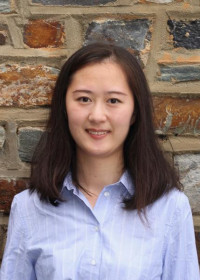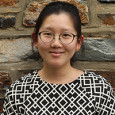

Profiles

E. Tomas Barraza (Chambers Scholar) is currently a third year PhD student in the Department of Electrical & Computer Engineering under the supervision of Dr. Adrienne Stiff-Roberts. In 2016, he graduated cum laude from North Carolina State University with a BS degree in Electrical Engineering. While at NC State, Tomas used polarimetry techniques to assess the integrity of aircraft coatings in Dr. Michael Kudenov’s Optical Sensing Lab. He also worked under Dr. Leda Lunardi researching soft lithography techniques for biomedical applications. At Duke, Tomas has worked on using resonant infrared matrix-assisted pulsed laser evaporation (RIR-MAPLE) to deposit a class of novel hybrid organic-inorganic materials called perovskites. Recently, Tomas’ published work demonstrated the viability of RIR-MAPLE in the deposition of perovskites by creating solar cells. His focus is now on identifying any effects on the crystal structure of perovskites deposited by RIR-MAPLE. Ultimately, Tomas hopes to study how RIR-MAPLE can be used to deposit complex hybrid perovskite materials with unique light-emitting and photophysical properties that cannot be produced by simpler processing methods.

Erika Chelales (Chambers Fellow) is a first year Ph.D. student in Duke University’s Biomedical Engineering Department. In 2018, Erika graduated summa cum laude from Tulane University with a BSE in Biomedical Engineering and a minor in Spanish. During her undergraduate studies she worked in Dr. Damir Khismatullin’s Biomedical Acoustics laboratory where she developed a Matlab based guided user interface (GUI) to analyze videos of acoustic tweezing thromboelastometry. Additionally, in the summer of 2016, Erika was a research intern under the advisement of Dr. Pete Kollbaum at the Clinical Optics Research Lab at Indiana University where she developed a Matlab based GUI program for text-size analysis. In the summer of 2017, Erika participated in the Research Internships in Science and Engineering program where she studied remote photo-acoustic tomography using speckle sensing analysis at Friedrich–Alexander University in Erlangen, Germany. These internships sparked her interest in optics and motivated her to study optical imaging in graduate school. At Duke, Erika is working with Dr. Nimmi Ramanujam, and hopes to develop low cost techniques for treatment of breast and cervical cancer.

Evan Jelly (Chambers Fellow) is a PhD student in Duke University’s Department of Biomedical Engineering, under the advisement of Professor Adam Wax. He is a graduate of The College of New Jersey with a BS in Physics, and Cardiff University with a MSc in Biophotonics with distinction. Additionally, Evan has held positions with GE Healthcare Cell Technologies and Florida State University, where he worked towards the generation of custom Förster resonance energy transfer (FRET) constructs for use in dynamic cellular imaging and commercial cytotoxicity assays. At Duke, Evan is investigating methods for improved depth resolution in Optical Coherence Tomography (OCT), as well as novel applications for Low-Cost OCT in resource limited settings. Aside from research, Evan is active in both scientific outreach and policy initiatives.

Mucong Li (Fitzpatrick Scholar) is currently a second-year PhD student under the supervision of Professor Junjie Yao in the Department of Biomedical Engineering. She received the B.S. and M.S degree in Control Science and Engineering from Harbin Institute of Technology, China. Her research involves using photoacoustic imaging (PA) system to dynamically monitor the hemorrhaging occurred during the shockwave lithotripsy (SWL), as well as predicting hemorrhages through mapping of cavitation bubble collapses induced by the shockwave pulses (PCM). She, together with her colleagues, has built an integrated PA-PCM system that is able to detect hemorrhages and cavitation collapses without interrupting the shockwave treatment procedure or wave interference. This system has been validated both on phantom and small animal studies. Substantial signal increases have been shown on the photoacoustic images when applying increasing numbers of shockwave pulses, demonstrating the dynamic-hemorrhage-detection capability of photoacoustic imaging during the shockwave treatment. Currently, she is working on internally illuminating kidneys through an optical fiber during the SWL so that the photoacoustic imaging depth can be extended to 8 cm to 10 cm. Her long-term goal is to integrate this technology to clinic shockwave-lithotripsy procedure seamlessly and provide physicians real-time feedback on hemorrhage occurrence during the SWL, so that the shockwave treatment settings can be adjusted in time to avoid hemorrhage to patients

Junfei Li (Chambers Scholar) is currently a fourth year PhD student in the department of Electrical and Computer Engineering working under the guidance of Professor Steven A. Cummer. He graduated from Beijing Institute of Technology in 2015 with a BS in Mechanical Engineering. Junfei is interested in a wide range of engineered materials. As an undergraduate, his research spans material chemistry, experimental mechanics and acoustic metamaterials and metasurfaces. His current work at Duke is mainly focused on designing highly efficient acoustic metamaterials and metasurfaces, including designing efficient acoustic absorbers, controlling bianisotropic responses in metasurfaces for highly efficient wavefront control and complex field generation, boosting sound transmission through interfaces, and exploring non-reciprocal sound transmission through space-time modulated media. His current research could potentially benefit medical imaging, ultrasound treatment systems and non-destructive testing.

Jessica Loo (Chambers Scholar) is a second year Ph.D. student in the Department of Biomedical Engineering. She graduated with first class honors from Imperial College London with an MEng in Biomedical Engineering. At Duke University, she works under the guidance of Dr. Sina Farsiu in the Vision and Image Processing Laboratory. Her research is focused on developing automatic algorithms for medical image analysis, primarily for ophthalmic imaging modalities such as optical coherence tomography (OCT). Her most recent work is the development of a novel algorithm for the automatic segmentation of photoreceptor defects on retinal OCT images, which can provide quantitative data for diagnosing and monitoring retinal and neurodegenerative diseases.